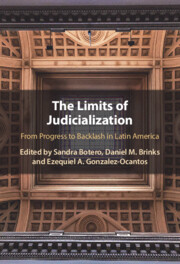Book contents
- The Limits of Judicialization
- The Limits of Judicialization
- Copyright page
- Contents
- Figures
- Tables
- Contributors
- Acknowledgments
- 1 Working in New Political Spaces
- 2 Critical Disconnects
- 3 When Winning in the Courts Is Not Enough
- 4 Forms of Countermovement and Counter-Reform in Latin America
- 5 Backlash against State Strengthening Reforms
- 6 Backlash against Corporate Accountability for Grave Human Rights Violations in Colombia
- 7 Courting Judicial Legitimacy
- 8 Family Ties and Nepotism in the Mexican Federal Judiciary
- 9 Judicial Corruption
- 10 Kickbacks, Crackdown, and Backlash
- 11 Turning Corruption Trials into Political Tools in the Name of Transparency
- 12 Fighting Corruption, Dismantling Democracy
- 13 Prosecutorial Agency, Backlash and Resistance in the Peruvian Chapter of Lava Jato
- Index
- References
8 - Family Ties and Nepotism in the Mexican Federal Judiciary
Published online by Cambridge University Press: 11 August 2022
- The Limits of Judicialization
- The Limits of Judicialization
- Copyright page
- Contents
- Figures
- Tables
- Contributors
- Acknowledgments
- 1 Working in New Political Spaces
- 2 Critical Disconnects
- 3 When Winning in the Courts Is Not Enough
- 4 Forms of Countermovement and Counter-Reform in Latin America
- 5 Backlash against State Strengthening Reforms
- 6 Backlash against Corporate Accountability for Grave Human Rights Violations in Colombia
- 7 Courting Judicial Legitimacy
- 8 Family Ties and Nepotism in the Mexican Federal Judiciary
- 9 Judicial Corruption
- 10 Kickbacks, Crackdown, and Backlash
- 11 Turning Corruption Trials into Political Tools in the Name of Transparency
- 12 Fighting Corruption, Dismantling Democracy
- 13 Prosecutorial Agency, Backlash and Resistance in the Peruvian Chapter of Lava Jato
- Index
- References
Summary
To what extent are employees in the Mexican judiciary – both judges and lower level officials – connected by family ties? Are these family connections used inappropriately to hire or to favor relatives in ways that would not have been possible absent the family connection? This chapter takes advantage of a unique dataset to answer these questions. It documents a departure from the promise made in the judicial reform of 1994, that by removing the administration of the judiciary from the Supreme Court and transferring it to a judicial council, a professional and meritocratic judicial career would be established for all federal judges, making merit and not connections the main determinants of becoming a judge. The sheer magnitude and pervasiveness of family relationships within the Mexican federal judiciary conspicuously show the limitationsof this reform and highlight the challenges Mexico faces to consolidate judicial careers.
- Type
- Chapter
- Information
- The Limits of JudicializationFrom Progress to Backlash in Latin America, pp. 195 - 216Publisher: Cambridge University PressPrint publication year: 2022
References
- 1
- Cited by

